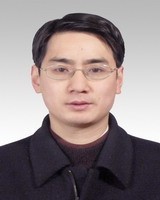Recording: https://disk.pku.edu.cn:443/link/88528D27D91D084510E18D2A213A35EF
Valid Until: 2027-07-31 23:59
Abstract: In this talk, we will introduce the existence of full horseshoe for the Galerkin truncations of 2D Navier-Stokes equations with degenerate stochastic forcing (Hypoelliptic condition). We will also review weak horseshoe and semi-horseshoe. This is based on joint work with Jianhua Zhang.
Bio: Huang Wen is a professor of Mathematics at the University of Science and Technology of China (USTC). In 2003, he received his Ph.D. from the Department of Mathematics, USTC.
Prof. Huang is engaged in the research of the complexity theory of dynamical systems and its application in combinatorial number theory and differential equations. In recent years, he and collaborators have made progress in entropy and Sarnak's Möbius disjointness Conjecture, Multiple Recurrence and Multiple Ergodic theory, and the Fokker-Planck equation and its stationary measure: (1) it is proved that under both deterministic and random frameworks, positive entropy systems have weak horseshoes, partially hyperbolic systems with positive entropy have semi-horseshoes and subpolynomial average complexity systems satisfy Sarnak's Möbius disjointness Conjecture; (2) Prove the pointwise Multiple Ergodic Theorem for ergodic distal systems. The characteristic factor theory of minimal systems was established. (3) A new metric is constructed in the space of all probability measures on a finite graph, from which the Fokker-Planck equation is established. Related work has been published in journals such as CPAM, JEMS, MAMS, Adv. Math, CMP, and so on.
He was awarded the 2012 China National Science Funds for Distinguished Young Scientists; the 2018 National Ten Thousand Talent Program Leading Scientists, P.R.China; the 2018 Second Class National Natural Science Award, P.R.China (ranked 2); the 2021 18th Chen Shing-Shen Mathematics Prize (issued by the Chinese Mathematical Society).
